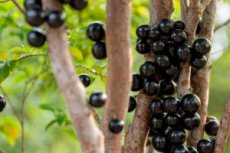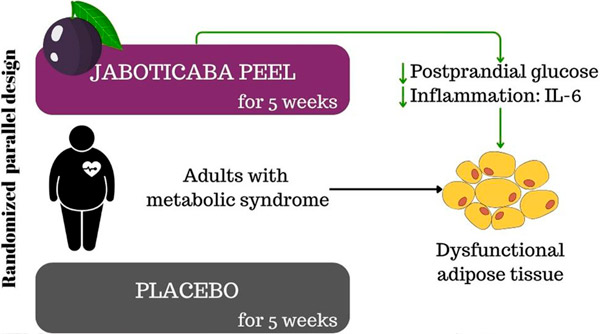New publications
Jaboticaba peel reduces inflammation and blood sugar in metabolic syndrome
Last reviewed: 02.07.2025

All iLive content is medically reviewed or fact checked to ensure as much factual accuracy as possible.
We have strict sourcing guidelines and only link to reputable media sites, academic research institutions and, whenever possible, medically peer reviewed studies. Note that the numbers in parentheses ([1], [2], etc.) are clickable links to these studies.
If you feel that any of our content is inaccurate, out-of-date, or otherwise questionable, please select it and press Ctrl + Enter.

The skin or rind of the jaboticaba berry (Plinia jaboticaba), native to Brazil's Atlantic Forest, is commonly discarded due to its astringency (due to the high amounts of tannins that cause an astringent sensation in the mouth), but it may be a powerful ally in the treatment of obesity and metabolic syndrome, as shown in a paper published in the journal Nutrition Research.
A study conducted by researchers at the University of Campinas (UNICAMP) in the state of São Paulo, Brazil, found that inflammation and blood sugar levels improved in volunteers with obesity and metabolic syndrome who took 15 grams of jaboticaba peel powder per day for five weeks as a dietary supplement.
"The phenolic compounds and dietary fibres present in the skin of jaboticaba have the ability to modulate glucose metabolism. We have observed this effect in previous studies. This study aimed to study the benefits of long-term consumption and showed that the positive effect on blood sugar levels extends to the period after meals, that is, postprandial glycemia. Blood sugar levels usually rise after meals, even in healthy people, although in such cases they soon return to normal. Something that can reduce blood sugar levels after meals is interesting because it helps people control this indicator over time and live a healthier life," Mario Roberto Marostica Junior, the last author of the article and a professor at UNICAMP, told FAPESP.
The study involved 49 patients with metabolic syndrome and obesity, who were divided into two groups: one took 15 grams of jaboticaba peel powder per day for five weeks, and the other took a placebo. Body weight, waist circumference, blood pressure, metabolic and inflammatory parameters such as interleukin-6 (a marker of obesity and systemic inflammation) were assessed at weeks zero and five, and blood sugar levels were measured regularly.
"The main benefits of taking the supplement were lower postprandial glycemia and reduced inflammation. Jaboticaba can't do miracles, but it is a great way to help control blood sugar. Of course, it should be used in combination with other measures, such as a healthy diet and exercise," he said.
Bioactive Compounds Phenolic compounds present in jaboticaba peel include anthocyanins, which give the berry its deep purple color and improve glucose metabolism, primarily by stimulating the L-cells in the intestines. "When these substances reach the intestines, they come into contact with the L-cells, which release a compound called GLP-1 [glucagon-like peptide-1], which in turn triggers the release of insulin by the cells in the pancreas," he said.

Insulin, secreted by the pancreas, improves glucose utilization. "That's one of the functions of insulin. When it reaches muscle cells, which are the main users of glucose, insulin triggers a cascade of signals that promote glucose transport into the cell," he said.
Metabolic syndrome is a cluster of metabolic and hormonal abnormalities that increase the risk of heart disease, including high blood pressure and blood sugar, abdominal obesity, and abnormal levels of triglycerides and HDL cholesterol. In the study, 49 participants with metabolic syndrome had at least three of these five abnormalities.
Obesity is usually associated with abnormally high levels of pro-inflammatory molecules. "It's like having constant inflammation in a person. It interferes with the action of insulin, so overweight and obese people tend to have insulin resistance. In these cases, insulin is normally produced but it doesn't work properly," he said.
Abnormally high blood sugar levels can lead to type 2 diabetes if not treated with medication and/or healthy habits and weight loss. "Jaboticaba peel supplementation reduces interleukin-6 levels, which plays a key role in insulin resistance and promotes inflammation in adipose tissue. Its positive effect on postprandial blood sugar and inflammation makes it an ally in the treatment of metabolic syndrome," he said.
No one wants to eat jaboticaba peel on its own because of its astringency, he acknowledged, "but this problem can be circumvented by using commercially available extracts and supplements."
